The Department has qualified faculty members with well-equipped laboratories - Devices and IC's Laboratory, Sensors and Measurements Laboratory, Biomedical instrumentation laboratory, Medical Image processing laboratory, Diagnostic and therapeutic equipment laboratory, Life Sciences Laboratory, Medical Equipment Laboratory.
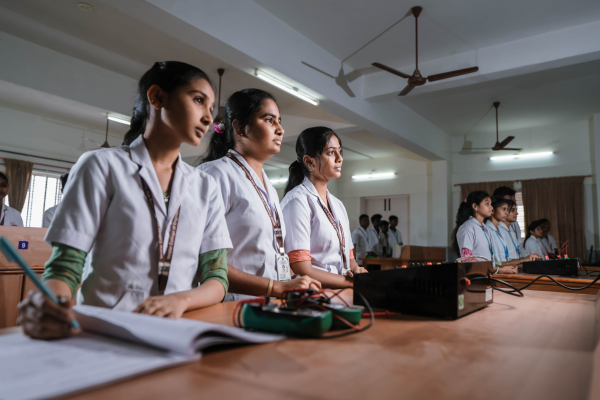
DEVICES AND IC'S LABORATORY
Application Devices and IC's laboratory comprise of three lab courses, here the students are learning about Circuits and Devices, Electronic Circuits, Analog and Digital Integrated Circuits. The goal of this laboratory is to supplement the theory courses
Semiconductor Devices, Basic Electrical Engineering to assist the students in obtaining a better understanding of the operation of complex electronic circuits and devices and to provide experience in analyzing network theorems. helps to introduce the fundamental principles of amplifier circuits and to familiarize with feedback amplifiers and oscillators. It also gives insight into SPICE simulation of electronic circuits. The laboratory aims to provide practice in designing of combinational and sequential logic circuits. It also gives design experience in analog circuits in implementing amplifiers, active filters, waveform generators, comparator, multivibrators. This laboratory explores the novel application driven device designs and technology-aware circuit solutions based on emerging technologies to address the challenges of next-generation.
SENSORS AND MEASUREMENTS LABORATORY
Sensors and Measurements Laboratory is equipped with modern measurement instrumentation equipments, which helps the students to study different mechanism of measurement of Temperature, pressure, displacement, force, speed, torque, stress etc. Students learn to measure as well as develop the skill to

calibrate the temperature, pressure gauges etc and to provide the basic understanding about operational characteristics and applications of various sensors and transducers. Major Equipment are Strain gauge Trainer Kit, Load Cell Trainer Kit, LVDT trainer kit, Thermocouple, Thermistor and RTD trainer kit, LDR, Photo Diode, Photo Transistor Trainer Kit , Pulse Oximetry, Wheatstone bridge, Kelvin's Bridge, Schering Bridge, Respiration Rate Monitor
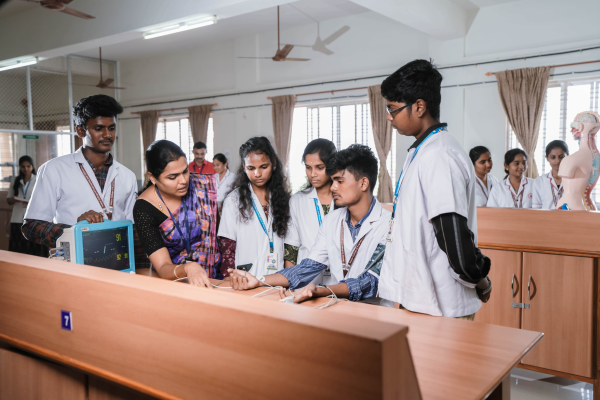
BIOMEDICAL INSTRUMENTATION LABORATORY
Biomedical instrumentation laboratory helps the students to gives knowledge of the principle of operation and design of medical equipment. This lab is dedicated to design, conduct and document laboratory experiments involving biomedical instrumentation and to obtain and analyze electrical signals from biological systems.
Instruments in the laboratory are used to measure, store and analyze the signals produced by biomedical phenomena. This helps to familiarize students with the basic design and implementation of techniques for measuring a broad scope of signal types for molecular, cellular and physiological research. The major equipment are Patient Monitoring System, Surgical Diathermy, Electrical Safety Analyzer, Digital Audiometer, ECG Simulator, ECG Processor, EMG Simulator, EEG Arrhythmia Analyzer, EEG Recorder, Pulse Oximeter, RTD Module, GSR Trainer & Analyzer, - Biotelemetry.
MEDICAL IMAGE PROCESSING LABORATORY
Medical Image processing laboratory is designed to support undergraduate students in the areas of signals and image processing. This laboratory provides practice to the students in the development and implementation of algorithms for processing speech, audio, image, video and more.
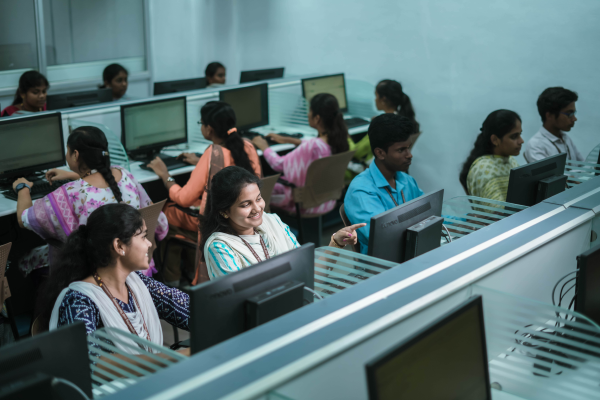
The students get familiarized with basic functions available in Image and Signal Processing Toolbox of MATLAB and Lab-VIEW. The algorithmic level exploration is carried out using a LabVIEW programming environment while the circuit level implementation is supported with a Multisim. It engages students to realize about different filter structure and also to develop algorithm for signal processing. It also demonstrates students the image transformation, enhancement, segmentation techniques and different texture analysis techniques.
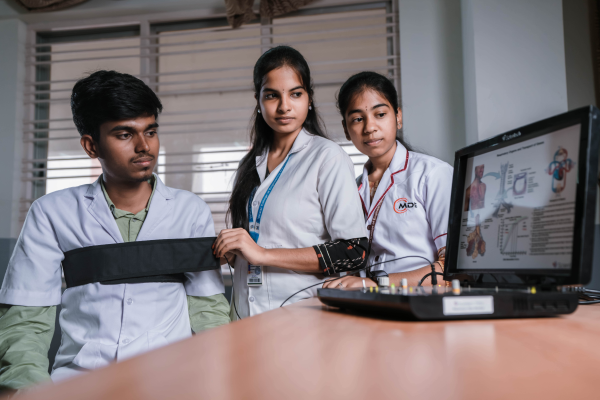
DIAGONISTIC AND THERAPEUTIC EQUIPMENTS LABORATORY
Diagnostic and therapeutic equipment laboratory is used to record and analyze the working principles of different biosignals. This helps to familiarize the students to study the various applications of diathermy in the field of medicine.
It is provide practice to the students on recording and analysis of different Bio potentials, to study various display techniques and use of ultrasonic's in various fields of medicine. It is also aimed to give overall idea about the application of ultrasonic and diathermy principles in clinical applications and transmission of biosignals using telemetry techniques, understand sources of leakage current and method of monitoring it and use Lab View in Design of ECG amplifier, recording and analysis. Major Equipment are ECG Arrhythmia Simulator ,Ultrasound Machine ,Multichannel Telemetry, Electrophysiological Recorder, Shortwave Diathermy , Defibrillator, Ultrasonic Diathermy, Pacemaker Simulator, Blood Flow Monitor, Digital Storage Oscilloscope, Spirometer, NI ELVIS Bioinstrumentation kit and 25 user LABVIEW software.
LIFE SCIENCES LABORATORY
The Course allows students to understand the causes and mechanisms of human disease, as well as how they are investigated in the laboratory. The course provides students a hands-on understanding of the impact of chemistry on human health and
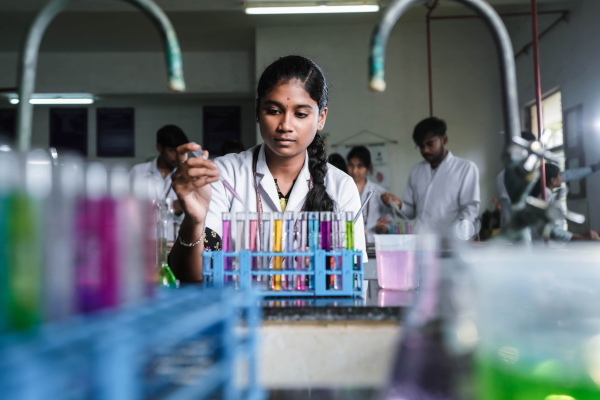
provides students with a research-inspired experience that introduces state-of-art biochemical techniques and physiological examinations in the context of investigating various medical disorders. Techniques include biochemical analysis of biological samples, purification of amino acids, proteins and DNA, virtual spectrophotometer, analysis of visual activity and hearing. Major Equipment are Visible spectrophotometer, Autoclave, Tissue processing unit ,Microtome, Colorimeter, Flame photometer, Refrigerated centrifuge, Clinical centrifuge, Direct and indirect ophthalmoscope, Incubators and electrical water bath.
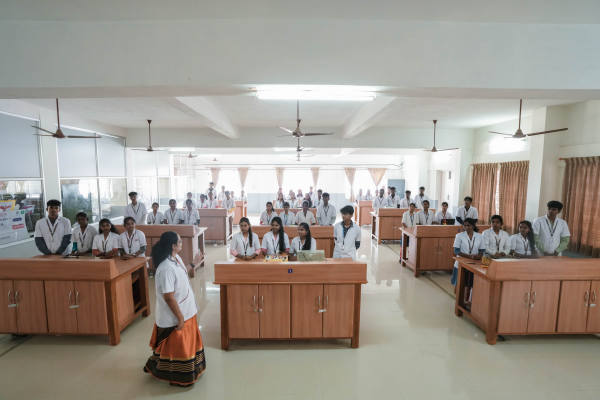
LINEAR AND DIGITAL INTEGRATED CIRCUITS LABORATORY
Linear and Digital Integrated Circuits laboratory provides an opportunity to learn the basic characteristics of the design of digital and analog circuits. Major Equipment are Digital IC Trainer Kit, Fixed Power Supply (+5V, +12V, −12V), Function Generator (3 MHz), Cathode Ray Oscilloscope (30MHz), Analog and Digital IC Tester, Digital Storage Oscilloscope (50 MHz).
MEDICAL EQUIPMENT LABORATORY
The Medical Equipment Laboratory course provides students with a comprehensive understanding of the principles and applications of medical equipment used in healthcare and research. It enables students to explore the working mechanisms, maintenance, and calibration of various medical devices used for diagnosis, treatment, and patient monitoring.
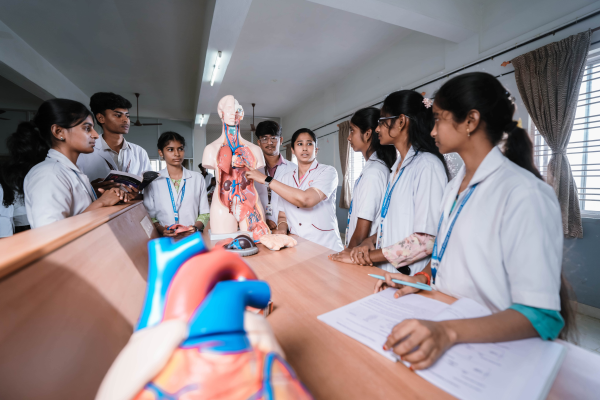
The course offers hands-on experience with cutting-edge biomedical technologies and diagnostic tools, allowing students to gain practical insights into their operation and significance in medical settings. Key techniques covered include biomedical signal acquisition, patient monitoring systems, X-RAY machines, diagnostic imaging principles, and calibration of medical instruments.